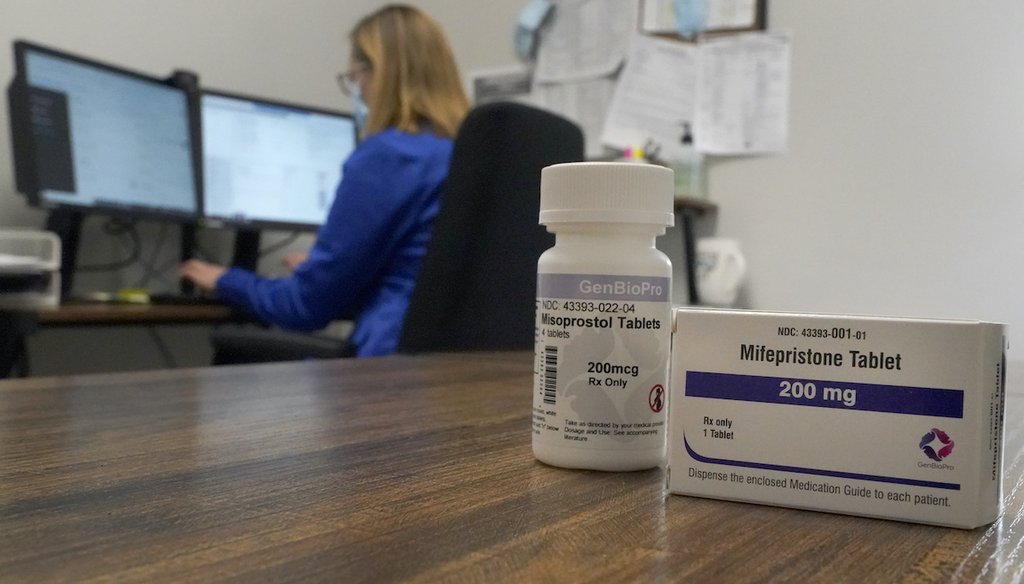Get PolitiFact in your inbox.

A nurse practitioner works at a Planned Parenthood clinic where she confers via teleconference with patients seeking self-managed abortions as containers of the medication used to end an early pregnancy sits on a table nearby Oct. 29, 2021. (AP)
If Your Time is short
-
If Roe v. Wade is overturned by the U.S. Supreme Court, states may enact bans on abortion including both in-person surgical abortion and medication abortion, commonly referred to as the abortion pill.
-
Several states have already passed restrictions that reduce access to medication abortion such as requiring in-person counseling or ultrasounds or bans on telehealth.
-
Medication abortion in 2020 became the most commonly used form of abortion for the first time in the U.S.
A draft Supreme Court ruling that would overturn Roe v. Wade means that abortion pills may become a key part of the next legal frontier to access to abortion.
If finalized, the ruling would overturn the 1973 Roe v. Wade court opinion that established a national right to an abortion, as well as a later ruling, Planned Parenthood v. Casey, that affirmed the right. If that happens, then each state could set laws about whether and when to allow abortion. Some states already have laws that would reinstate abortion restrictions if Roe v. Wade is overturned.
We wondered about what such a future ruling could mean for medication abortion, commonly referred to as the abortion pill. About half the states would be expected to enact laws that would ban abortion — and that would apply to both surgery and the abortion pill.
"If Roe v. Wade is overturned, states will be able to ban abortion, full stop," said Kelly Krause, a spokesperson for the Center for Reproductive Rights, a global advocacy and legal organization. "The method of abortion doesn’t matter."
Each state will decide whether abortion will be allowed and under what circumstances, which would include medication abortion, said Heather Hacker, a Texas lawyer who formerly worked for the Texas attorney general.
Many states have already passed restrictions that reduce access to medication abortion.
Some "states may allow abortion but require an ultrasound first, which may not be compatible with ordering abortion pills through the mail," Hacker said. "Some states have regulations that directly apply to medication abortion, like requiring that the pill be dispensed in person after providing informed consent information or prohibiting telehealth abortions, which could also impact the legality of obtaining pills through the mail."
More states may follow with their own restrictions.
The effect could be profound: As of 2020, abortion pills became the most common way to terminate a pregnancy in the United States, according to preliminary data by the Guttmacher Institute, a pro-abortion rights research organization.
The leaked draft Supreme Court ruling published by Politico on the evening of May 2 prompted a huge uptick in people searching for information about how to obtain abortion bills, including on Plan C, a website that lists information about how to get abortion pills in each state. Plan C’s website went from a baseline of about 2,300 hits per day in recent weeks to 56,000 on May 3, said co-director Elisa Wells.
The medication option for abortion in about the first 11 weeks of pregnancy involves a combination of two medicines — mifepristone and misoprostol — that are typically taken around 24 hours apart. Studies have found that around 95% to 98% of patients who take the medicines as prescribed will end their pregnancies without harm to themselves.
This method gained popularity amid the COVID-19 pandemic as patients increasingly turned to telehealth and following years of clinic closures. The U.S. Food and Drug Administration in 2021 lifted restrictions on access to the pills, allowing patients to receive the medication by mail in states that do not restrict telehealth for abortion pills.
There are two main routes to medication abortion: clinician supported, which means patients have a consultation, over video, telephone or email, before a provider mails them pills or has them filled at a pharmacy. The other route is self-managed abortion in which a person finds the pills online without a doctor, or from another country.
Aid Access, which launched in 2018, provides abortion medication for all 50 states, said Christie Pitney, a midwife who serves Aid Access. The organization has U.S. providers who prescribe in 20 states while, in the other states that have erected barriers to abortion pills, a doctor in Austria writes the prescription. Pills from a U.S. provider typically cost about $150 and they are usually delivered by mail in two to three days. Prescriptions written from Europe can cost around $110 and take two to three weeks to ship from India.
Interest in advanced prescriptions exploded from a typical 40 or so a day to more than 5,000 for the first two days combined after the leaked court opinion, Pitney said.
Kaiser Family Foundation found as of February that 19 states had policies that either ban telehealth for abortion or make it difficult, such as requiring an ultrasound or in-person counseling.
Following that Kaiser analysis, a couple more states passed restrictions including Kentucky, which outlawed abortion medication by mail, and South Dakota, which codified into law an executive order that bans telemedicine for abortions. That law is under a court injunction.
If Roe v. Wade is overturned, several states will outright ban or severely restrict abortion.
"In many cases, clinics will no longer be allowed to operate and be forced to close, which means a loss of access to medication abortion," said Rebecca Wang, a lawyer for If/When/How, a legal reproductive justice group.
It gets more legally complicated when it comes to getting abortion pills outside of the formal healthcare system, Wang said. Both mifepristone and misoprostol are considered prescription medications, and all the requirements for obtaining, possessing, dispensing, and using prescription medications apply to them.
Currently, Oklahoma, Nevada, and South Carolina explicitly prohibit self-managed abortion.
Organizations that provide abortion medication and are located outside of the United States are not subject to U.S. enforcement — whether private, state, or federal, said the Center for Reproductive Rights. However, during the Trump administration in 2019, the FDA sent a cease-and-desist letter to Aid Access, which is based in Austria. The letter stated that the specific brand of mifepristone and misoprostol Aid Access was sending out was not FDA approved. That didn’t stop Aid Access, which has continued to prescribe the same medication for patients in the U.S.
The Susan B. Anthony List, a national group that supports political candidates who support abortion restrictions, told PolitiFact it will "strongly support legislation and candidates who seek to restrict access to abortion pills."
There are lots of unsettled issues about the liability of people who send medication from another state to be taken by a woman in a state with a ban, said Priscilla J. Smith, director of the program for the Study of Reproductive Justice at Yale Law School.
"Whether they can do so depends on whether a state's law applies to out-of state conduct," Smith said.
Kimberly Mutcherson, co-dean of the Rutgers Law School and a reproductive justice scholar, said if states want to punish out-of-state providers for sending pills through the mail, "they’ll have to be able to identify the seller and get jurisdiction over them, which could also be hard to do to the extent that people might be able to mask their identities or could be operating overseas."
Prosecutors also have discretion when it comes to deciding which cases to pursue.
Following the passage of laws in numerous states restricting abortion access, dozens of prosecutors and attorney generals signed a statement through a group called Fair and Just Prosecution in 2020 in which they pledged not to prosecute women who obtain abortions or health care professionals who assist them. But it’s also possible that some prosecutors will prioritize such cases.
RELATED: Do Republicans want to throw doctors who break abortion laws in jail? Their plans say yes
RELATED: What would state laws look like in a post-Roe world?
RELATED: Fact-checking 5 claims in the leaked Supreme Court draft opinion on Roe v. Wade
RELATED: How an unproven abortion ‘reversal’ treatment has advanced in the US
Our Sources
Kaiser Family Foundation, The Intersection of State and Federal Policies on Access to Medication Abortion Via Telehealth, Feb. 7, 2022
Kaiser Family Foundation, The Availability and Use of Medication Abortion, April 6, 2022
Guttmacher.org, Medication Abortion Now Accounts for More Than Half of All US Abortions, March 2, 2022
If/When/How, Reprolegalhelpline, Accessed May 4, 2022
Washington Post, The latest action on abortion legislation across the states, May 2, 2022
Newsweek, Abortion Pills That Are Legal in the U.S. And How to Order Online, May 3, 2022
Fast Company, After the SCOTUS leak, telemedicine startups are at a crossroads, May 4, 2022
Politico, Abortion advocates’ strategy depends on pills. An information gap threatens their efforts. April 24, 2022
Vox, The FDA made mail-order abortion pills legal. Access is still a nightmare. March 29, 2022
District Attorney Gocha Allen Ramirez, Statement on Facebook about dropping prosecution, April 2022
Fair and Just Prosecution, Elected Prosecutors Refuse to Prosecute Abortions, Even if Roe v. Wade is Overturned, Oct. 15, 2020
Fair and Just Prosecution, Statement, May 3, 2022
Reuters, Explainer: Can pill prescriptions overcome U.S. state abortion bans? May 4, 2022
Louisville Courier-Journal, With abortion suspended in Kentucky, two groups work to help women find services elsewhere, April 20, 2022
Sioux Falls Argus Leader, South Dakota Gov. Kristi Noem bans abortions via telemedicine, restricts abortion pills, March 23, 2022
Email interview, Kimberly Mutcherson, Co-Dean and Professor of Law, Rutgers Law School, May 4, 2022
Email interview, Elisa Wells, Plan C pills co-founder and co-director, May 4, 2022
Email interview, Heather G. Hacker, partner at Hacker Stephens and former Assistant Solicitor General in the Texas Attorney General’s office, May 4, 2022
Email interview, Rebecca Wang, JD, Legal Support Counsel at If/When/How, May 4, 2022
Center for Reproductive Rights, Statement to PolitiFact from lawyers via spokesperson Kelly Krause, May 4, 2022
Email interview, Priscilla J. Smith, director of the program for the Study of Reproductive Justice at Yale Law School, May 5, 2022
Telephone interview, Christie Pitney, a midwife who serves Aid Access, May 5, 2022
Email interview, Susan B. Anthony List’s Vice President of Communications, Mallory Carroll, May 5, 2022






































